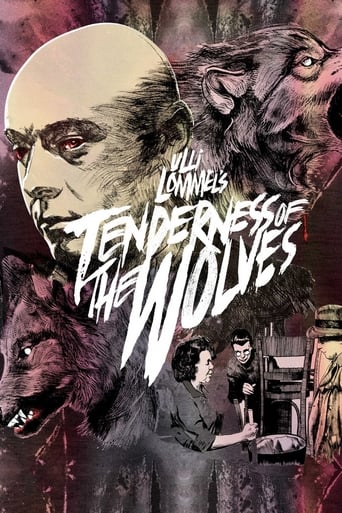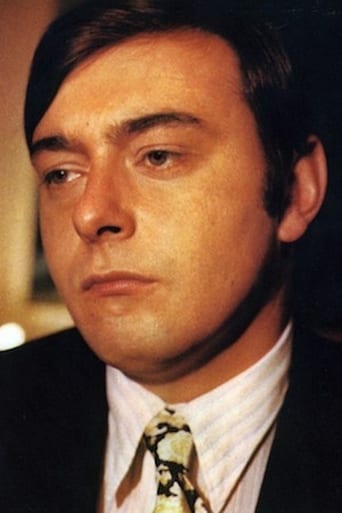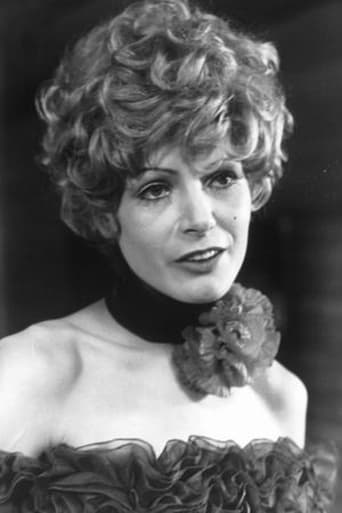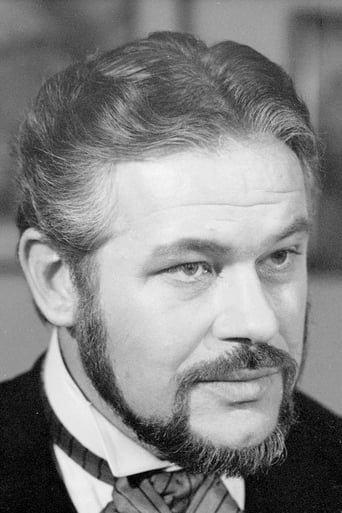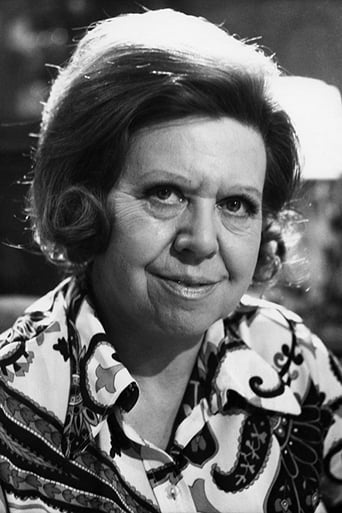Supelice
Dreadfully Boring
Glatpoti
It is so daring, it is so ambitious, it is so thrilling and weird and pointed and powerful. I never knew where it was going.
Brenda
The plot isn't so bad, but the pace of storytelling is too slow which makes people bored. Certain moments are so obvious and unnecessary for the main plot. I would've fast-forwarded those moments if it was an online streaming. The ending looks like implying a sequel, not sure if this movie will get one
Horst in Translation (filmreviews@web.de)
"Die Zärtlichkeit der Wölfe" or "Tenderness of the Wolves" is a West German German-language film from the year 1973, so this one has its 45th anniversary soon. Of course it is in color and has sound. The director here is Ulli Lommel and he is seen by many only as the make of a whole lot of trash movies. So this one here is possibly his most acclaimed work by critics. This may have a lot to do with the fact that he has not written the script for this one, maybe because it was very early in his career still. Lommel was still under 30 back then. The writer is Kurt Raab, who also plays the main character. One of the producers is Rainer Werner Fassbinder, which should not be too surprising as he worked with Raab on many occasions.This is the story of Fritz Haarmann, a German mass murderer from the early 20th century. There are more films about him. Fritz Lang's "M" is also partially based on Haarmann and the recently deceased Götz George plays Haarmann in the critically acclaimed "Der Totmacher", a more recent version. But back to this one here. It is a fairly short film, closer to 80 than to 90 minutes. And the tender wolf here is Kurt Raab's character, a sensitive man who ends up abusing and murdering several boys in order to satisfy his desires. He is working undercover for the police, which makes it especially interesting as they really take a whole lot until they finally find out. This is also a reference to the real Haarmann. All in all, it is Kurt Raab's stunning performance that carries the film nicely from start to finish without dragging. I thought for the entire film Raab looked like a vampire in here, so the final scene was very appropriate. What a shame Raab did not end up playing Nosferatu or so in another movie. At least I think he did not. As for this one here, it is a pretty decent watch. The lead performance and the parallel to real events certainly elevate the material. Go check it out.
Mark Turner
One thing I try to strive for is to watch as many movies from as wide a variety of sources and styles as possible. In doing so I might not like all of them but at least I've left myself open to seeing things outside of my comfort zone and exposed myself to things I might miss that are great and some that are the worst things imaginable.With that in mind I just watched TENDERNESS OF THE WOLVES, a 1973 movie directed by UIli Lommell. Lommell was a protégé of Rainer Werner Fassbinder and a part of the New German Cinema movement that ran during the early 70s. His career has gone up and down and he's delivered fairly mainstream films like THE BOOGEYMAN as well as several films that could be called "art films" before finally making his way to made for DVD movies that haven't fared that well. But there is always the possibility of his rising once more.TENDERNESS focuses on the true story of Fritz Haarmann, a German serial killer who did most of his nefarious deeds right after WWI. As played by Kurt Raab, Haarmann comes off as one of the most chilling murderers seen on screen. An out of the closet homosexual who preyed on young boys that he then murdered, Haarmann then went on to cut up his victims and sell their bodies as meat to friends who were in need of fresh meat. While that alone might make for a terrifying killer there is more behind the man to make him even more horrific.Raab plays Haarmann as a slightly shy yet smooth talking con man who convinces friends to ignore his odd behavior from time to time. Not only does he get them to ignore it, he talks his way out of an arrest by offering his services to the local police in helping them ferret out other criminals. With a fake badge in pocket he uses his influence to not only pass along information about his criminal competition, he also uses it to persuade young runaway boys to his apartment where he beds and then kills them. Raab has chosen a bald headed look that at times reminds us of Max Schreck as Nosferatu, a good comparison as Haarmann was also known as the vampire of Hanover due to his biting some of his victims on the neck.The movie takes on an odd feel for a number of reasons besides the pedophile serial killer at the center of it all. The people Haarmann associates with may belong to the lower criminal class but they are also seen as struggling to survive after their country has been beaten in war. There is a certain amount of sympathy to be felt for them and Lommell depicts that in subtle ways. The movie also has a bombed out feel in it's of settings and style of being filmed. The filmed world of Haarmann is a gray one lacking of color and life, much as that Germany would have been at the time. The few glimpses of color involve either his associations in a local bar or during the murder sequences.The life and times of Haarmann are seen here in the latter part of his life rather than attempting to cover his entire career. In the end the number of murders he committed with his lover Hans Grans has been listed as anywhere between 24 and 50 people. That many are not seen here. He isn't depicted as a raging lunatic but as I stated earlier, as a subtle and manipulative sort that isn't seen killing in the most brutal fashion of some movie killers but still in perhaps some of the most twisted ways.For a film coming out of the seventies it offers more full frontal nudity than most as well as touching on homosexuality that was still fairly taboo at the time. It doesn't condone or condemn the topic but instead uses it to develop its central character. If you find this offensive then the movie will do just that. I mention it so that those who might be are aware.In the end the movie is one I may have to watch a second time to fully understand or appreciate. While the story itself is interesting (enough so that another more famous movie, M, was based on this same tale), I found the pacing of the film to be slow and in trying to keep up with the translation of dialogue with what I was watching made me unable to fully appreciate what was on the screen at times. As a single viewing experience it was just so so for me. Perhaps my opinion will change the second time around. What I did find was an experience of watching a film from another country that didn't fit the Hollywood mold. That doesn't make it a good experience, just a different one.For the average viewer I'm not sure I would suggest watching this. For foreign film fans you will love it. For fans of Lommell and Fassbinder I have little doubt you will add it to your collection. For me, on the whole, it was interesting but nothing stupendous.
hasosch
Hans Beckert in "M" (1931) and Fritz Haarmann in "Die Zärtlichkeit Der Wölfe" (1973): Both films are based on the true story of the German series killer Fritz Haarmann (1879-1925).Comparing the two films, one feels the 40 years that lie between them. Peter Lorre, the Beckert of M., is not shown killing his victims. There is no blood, and the story is told as if we would gather it by change through rumors in the street and newspaper reports. On the other side, the magnificent actor Kurt Raab as Haarmann: We see how he picks his victims up - exclusively good-looking young boys. In "M", we are only told about missing little girls - perhaps the combination of series killer and homosexual would have been too much for the audience then. "Tenderness of the Wolves" is also in general much closer to the original Haarmann story - f.ex., when we see how Fritz sells sausages that he had made from the meat of his victims (Haarmann owned a short time a butcher store.) We see how Fritz lives, drinks and sleeps with his victims, and kills them. We also see him getting rid of their corpses in huge plastic bags which he sinks in the river. Nothing at all about the everyday's life of Hans Beckert: All we see him do, is walking up and then down the streets, sometimes visiting an inn for a schnapps. From his apartment that the police enters twice, we see his one table, nothing more. In the case of Fritz, we even meet his nosy and gossipy neighbors. So, when Beckert finally get caught by the horde of the mob, Lorre had to compensate all that what the director did not show us, so that we could not make ourselves a picture about Beckert, the human being. Therefore, Lorre is not allowed to just break together and admit his murders, but he is forced to cry also the motivations of his deeds into the jury. For me, what he is doing, is not convincing. It may have been more shocking in 1931 as it is now, but I doubt that, too. - On the other side, Kurt Raab alias Fritz was allowed to broadcast all his lust that he had with his boys, from the seduction via the intercourse up to his climax: the lethal bite in the neck. At the end, Fritz will say: "I give my life back in God's hands ... but I had them all, the handsomest of the handsomest". We feel his lust and believe him - because he had a chance to show it during the movie, we are his witnesses. But unfortunately nothing like that in M., so that Lorre's Beckert stays an isolated and widely artificially constructed figure, not a human, but a silhouette. On the other side Raab's Haarmann, played by the self-confessed pedophile homosexual Raab: There are moments in the movie where one trembles, if the actor has himself really under control - so good is his acting.
preppy-3
Never thought a film about a gay cannibal could be dull but...The movie IS well-done. It's well-directed, the acting is great and it has a creepy, unsettling atmosphere (as it should). It just gets bogged down, people acted REAL strange at times and just was downright dull! Still, it all happened and the film has artistic merit. There just wasn't enough material for a feature length film.
